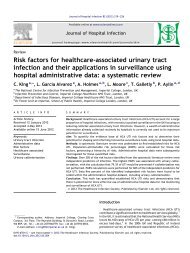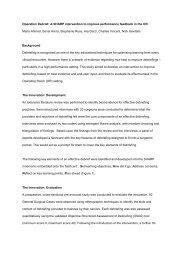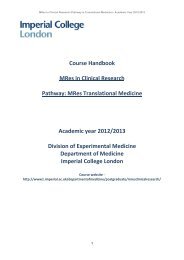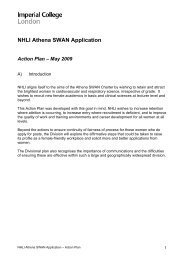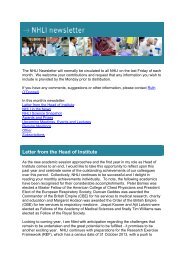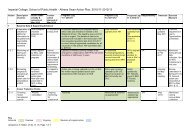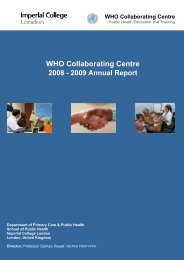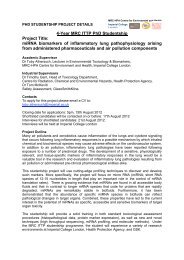QOF Plus Year 1 - Imperial College London
QOF Plus Year 1 - Imperial College London
QOF Plus Year 1 - Imperial College London
Create successful ePaper yourself
Turn your PDF publications into a flip-book with our unique Google optimized e-Paper software.
<strong>QOF</strong> indicators may therefore help to address this issue, with the aim of achieving additionalhealth gains in a more challenging group of patients.Why have a local <strong>QOF</strong>?Local Enhanced Services (LES) already provide scope for local development within the GMScontract. The purpose of these is to allow PCTs to tackle local problems not addressed in thenational <strong>QOF</strong>. These may include a greater emphasis on prevention and strategies designed toreduce inequity. It is anticipated that introduction of a local <strong>QOF</strong> would confer a number ofadvantages, including more robust performance reporting, mainstreaming quality throughtemplates and coverage of a greater number of areas.The concept of developing a local <strong>QOF</strong> has recently received backing from the National AuditOffice (2008) and the NHS Next Stage Review (Darzi, 2008).Development and implementation of a local <strong>QOF</strong> may also contribute to PCTs fulfilling theirfunctions as World Class Commissioners. The Department of Health describes World ClassCommissioners as being “central to a self-improving NHS. They will operate as learningorganisations, seeking and sharing knowledge and skills. World class commissioners will also bestimulating provider and clinical innovation through improvements in experienced quality, accessand outcomes” (DoH, 2008). As part of this commissioning process, PCTs are required to “investlocally to achieve the greatest health gains and reductions in health inequalities, at best value forcurrent and future service users”.The World Class Commissioning programme (DoH, 2008) outlines a series of competencies whichcommissioners will need to reach world class status. These are:locally lead the NHSwork with community partnersengage with public and patientscollaborate with cliniciansmanage knowledge and assess needsprioritise investmentstimulate the marketpromote improvement and innovationsecure procurement skillsmanage the local health systemmake sound financial investments5




